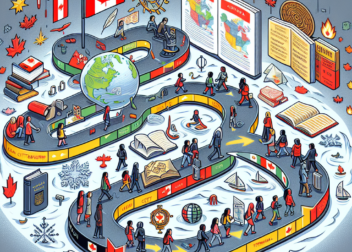Moving to Canada as a newcomer is an exciting yet overwhelming experience. With a rich blend of culture, natural beauty, and opportunities, it’s no wonder many people choose to immigrate. However, navigating the initial stages of settling in Canada requires careful planning and knowledge of essential procedures. This article aims to provide you with seven vital tips to ensure a smooth transition and successful arrival in Canada. Whether you’re a permanent resident, student, or temporary worker, these guidelines will help you settle with ease.
Canada Immigration and Arrival Procedures

1. Initial Entry Process:
Upon arriving at a Canadian airport, newcomers are required to go through several identity verification steps. These procedures are in place to ensure national security while facilitating your legal entry into the country. Once you arrive at the airport, border services officers will request your travel documents, such as your passport, visa, and any additional paperwork that verifies your entry status. This is the first critical step in making sure you’re recognized as a legitimate entrant into Canada.
One of the key security measures involves biometric screening. Newcomers will have their digital photos and fingerprints taken as part of this mandatory procedure. Whether you’re arriving as a student, worker, or permanent resident, this screening ensures that your identity is securely documented. The process is usually efficient, but being organized with your paperwork will help things go smoothly.
2. Document Requirements Based on Status:
Your document requirements will vary based on your immigration status. If you’re arriving as a permanent resident, make sure you have your Confirmation of Permanent Residence (COPR) and permanent resident visa. These documents are essential for finalizing your entry as a permanent resident and accessing your benefits. For international students and foreign workers, a valid study or work permit is necessary, along with a Temporary Resident Visa (TRV), if required. Missing any of these documents can delay your entry and processing.
It’s also important to note that specific visa and permit requirements may vary depending on your home country and the program you are entering under. For example, some workers may have employer-specific permits, while students need to ensure that their study permits match their intended programs. Double-checking your documentation before departure ensures you avoid unnecessary delays.
Choosing the right immigration experts is crucial for a smooth and successful journey. Ensure your consultants are licensed and approved by the government for trusted guidance. For reliable immigration support, explore our team of certified experts!
Essential Steps After Landing in Canada
3. Obtain Your Social Insurance Number (SIN):
Securing your Social Insurance Number (SIN) is one of the most important tasks after landing in Canada. This nine-digit number is vital for employment, filing taxes, and accessing government services. You can apply for your SIN online or in person at a Service Canada office. Make sure to carry your study or work permit, or proof of permanent residency, as these are required for the application.
Obtaining your SIN as soon as possible ensures that you can legally work and access government benefits. Without a SIN, employers cannot process your payments, and you won’t be able to file your taxes. Therefore, make this one of your first priorities to kickstart your integration into Canadian society.
4. Choose a Banking Partner:
Opening a bank account in Canada is another critical step for newcomers. Most major banks offer special newcomer packages that include benefits such as no monthly fees for the first year, free international money transfers, and other financial incentives. It’s essential to compare various banks and their offerings to find the best fit for your needs. Banks like RBC, TD, and Scotiabank often provide flexible services tailored specifically to new immigrants.
By choosing the right banking partner, you not only gain access to essential financial tools but also ensure that your money is secure and easily accessible. Many banks also provide financial literacy resources to help newcomers understand the Canadian banking system, manage their finances, and plan for their future.
Health and Residency Essentials
5. Apply for Health Insurance:
Healthcare in Canada is publicly funded, but newcomers must apply for health insurance through their respective provinces. Each province and territory administers its own healthcare program, so the coverage and application process may vary. For example, in some provinces, there is a waiting period of up to three months before you’re eligible for coverage, while in others, healthcare may be accessible immediately.
It’s crucial to apply for health insurance as soon as you settle in your province. Having health coverage protects you from incurring high medical costs and ensures that you can access essential healthcare services, including doctor visits and hospital care. In the meantime, consider getting private health insurance to cover the waiting period.
6. Settle into Your New Community:
Building a sense of belonging is an essential part of integrating into Canadian society. After securing your health insurance, it’s important to explore your local community to find support services that can help ease your transition. Many cities and towns have community centers, libraries, and newcomer programs offering valuable resources, such as language training, employment workshops, and cultural adaptation assistance.
Getting involved in local activities can make your settlement process much smoother. Whether it’s attending community events or participating in neighborhood meetups, connecting with locals and other immigrants helps you build a social network and get accustomed to your new environment. These resources can also introduce you to job opportunities and housing options, which are often recommended through word of mouth.
Additional Tips for a Smooth Transition
7. Understand Canadian Laws and Regulations
Understanding Canadian laws, especially those relating to employment and residency, is vital for newcomers. Each province has different labor laws regarding work hours, overtime, and worker’s rights, which you should familiarize yourself with to ensure you’re being treated fairly. Similarly, understanding tenant laws is crucial if you’re planning to rent a home or apartment.
As a newcomer, you may also need to adjust to different tax regulations. Canada has a progressive tax system, meaning your income will be taxed based on your earnings, with higher earners paying a higher percentage of their income. Be sure to learn about the Canadian tax filing process and the deductions or benefits available for newcomers, such as the GST/HST credit or the Canada Child Benefit (CCB).
8. Secure Temporary Housing and Look for Permanent Options
Once you’ve landed, securing temporary housing should be one of your immediate priorities. Many newcomers book short-term rentals, such as Airbnbs or motels, to cover the first few weeks while they search for permanent accommodations. Online platforms like Kijiji or Craigslist, along with dedicated newcomer housing services, can be excellent resources for finding a place to live.
When looking for a more permanent housing option, consider proximity to public transportation, work, and community services. It’s also important to budget for housing costs, as rent can vary significantly across Canada, with cities like Toronto and Vancouver being more expensive than others.
9. Register for Provincial Services
Each province offers various services to assist newcomers, from free language classes to employment assistance and housing support. These services are typically available through settlement organizations and can be instrumental in helping you adjust to life in Canada. Take advantage of these free services to develop new skills, find job opportunities, and improve your language proficiency.
Registering for these services early on ensures that you receive the help you need to thrive in Canada. Whether you need help with job placement or improving your English or French skills, these provincial programs are designed to support your successful integration into Canadian society.
Moving to Canada comes with its own set of challenges, but by following these vital tips, you can navigate the complexities of immigration and settle smoothly into your new life. From securing essential documents to applying for healthcare and financial services, each step is crucial to your successful integration. Remember to take advantage of community resources and government services to help you thrive in your new environment. With the right preparation, Canada can offer endless opportunities for personal and professional growth.


